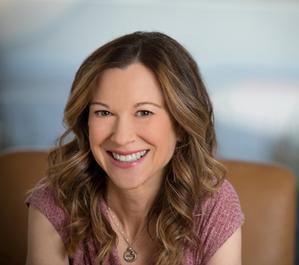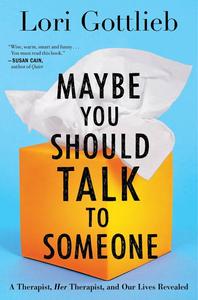
|
|
| photo: Shlomit Levy Bard | |
Lori Gottliebis a psychotherapist and author who writes the Atlantic's weekly "Dear Therapist" advice column. She also writes regularly for the New York Times, and has appeared on the Today Show, Good Morning America, CBS This Morning, CNN and NPR. Her new book is Maybe You Should Talk to Someone: A Therapist, Her Therapist, and Our Lives Revealed (reviewed below), out now from Houghton Mifflin Harcourt.
What inspiration drove this project?
It's a book about the human condition. I tried to bring people behind the curtain to let them see what others are going through. The questions people bring to us are the questions we have about our own lives. Whatever the presenting problem is, we're really asking about love, meaning, acceptance, shame and mortality, and all these deep issues we try to make sense of if we're living an examined life.
For people who are afraid of therapy, I hope it demystifies what we're doing and thinking. There's no big secret to what we do.
As a therapist, was it daunting to disclose so much about your personal life?
Writing about other people's struggles without humanizing myself felt sterile. When people come to talk to a therapist, of course they don't want to hear about their therapist's personal life, nor would it be helpful. Still, it's important to remember that we're more the same than we are different. One of the best qualities a therapist brings to the table is the fact that we know what it's like to be a person in the world. Without that, you can have all the training and experience, but you wouldn't be as effective and able to help people.
When I turned in my first draft, my editor said, "I think you were very careful." I had to grapple with the fact that I couldn't be more careful with myself than with my patients. You are vulnerable when you put yourself out there, but you're doubly so when people in your professional life don't know a lot about you. I wanted to take away that stigma. I wanted people to know that there's nothing shameful about going through the daily problems of living. Everyone has things that are challenging for them. Whether they're big or small, or current or past, it's a common denominator that we all share.
What did you take away from your experience with your therapist Wendell?
He helped me to see how to bring more of myself into the room because he brought so much of himself into the room. He brought his personality and his humanity. It helped me to be much more relational in the room with my patients. The idea of the therapist as this blank slate? That's not the way I wanted to be.
 Do you believe that the planned television show based on Maybe You Should Talk to Someone will portray therapy and therapists accurately?
Do you believe that the planned television show based on Maybe You Should Talk to Someone will portray therapy and therapists accurately?
That's a prerequisite. I have a lot of input and am a consultant and producer. Some people said, "It's Grey's Anatomy in a therapy office," and I'm like, "Hmm, I wish we had that much fun!" The spirit of the stories and the emotional resonance are things that happen to therapists in general. It's a great world, a fascinating world. What other profession is there where you're at the core of the human experience every day?
The show treats talking about our lives as a normal thing to do. It takes away the secrecy and shame and the Facebook and Twitter of it all--the curated version we put out there under the guise of sharing personal information.
You also write the column "Dear Therapist" for the Atlantic. How is it different from in-person therapy?
In my column, I try not to offer therapy or advice. It's more like, "I want you to look at this the way a therapist would, because it will help you find an answer more easily than the story you're telling yourself." The job of a therapist and the job of a writer are very similar. You help people edit stories. In therapy, people have the idea that their version of the story is accurate, but usually there are holes in the story. I help them to look at who the major and minor characters are. Is the protagonist going in circles or moving forward? Are there other perspectives? Showing people how to be more flexible with their stories is a universal way of helping them, especially with stories they've carried for a long time that aren't helping, like "I'm unlovable" or "I'm not good enough."
What did you learn from the experiences in your memoir that you most want to share with readers?
What I found most surprising about being a therapist and patient was how hard it is to change. Even though it can be good and positive, there's also loss involved. If we change, we have to go into unfamiliar territory, and that can be incredibly anxiety-provoking. Being aware that change is scary normalizes it, and talking to people so you realize you're not so different lets you know it's normal to be scared. Especially today, we think, "I have to have it all together, I have to appear as though I know what I'm doing." That takes away something normal about being a person, and I hope we can all let ourselves off the hook a little bit. I hope the book does that. I hope people see themselves in it and can see themselves more clearly. Even though it's not about happiness, I hope it will make people happier. --Jaclyn Fulwood

